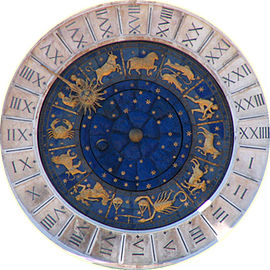Terms or bounds
| Astrology | |||||||||||
|---|---|---|---|---|---|---|---|---|---|---|---|
| The astrological signs | |||||||||||
| Astrology categories | |||||||||||
|
Expand list |
|
||||||||||
| Branches of astrology | |||||||||||
| The planets in astrology | |||||||||||
|
|
Astrology project | ||||||||||
Expand list
for reference
Astrology is the study of the movements and relative positions of celestial objects as a means for divining information about human affairs and terrestrial events. Astrology has been dated to at least the 2nd millennium BCE, and has its roots in calendrical systems used to predict seasonal shifts and to interpret celestial cycles as signs of divine communications. Many cultures have attached importance to astronomical events, and some – such as the Indians, Chinese, and Maya – developed elaborate systems for predicting terrestrial events from celestial observations. Western astrology, one of the oldest astrological systems still in use, can trace its roots to 19th–17th century BCE Mesopotamia, from which it spread to Ancient Greece, Rome, the Arab world and eventually Central and Western Europe. Contemporary Western astrology is often associated with systems of horoscopes that purport to explain aspects of a person's personality and predict significant events in their lives based on the positions of celestial objects; the majority of professional astrologers rely on such systems.
Throughout most of its history astrology was considered a scholarly tradition and was common in academic circles, often in close relation with astronomy, alchemy, meteorology, and medicine. It was present in political circles, and is mentioned in various works of literature, from Dante Alighieri and Geoffrey Chaucer to William Shakespeare, Lope de Vega and Calderón de la Barca. During the 20th century and following the wide-scale adoption of the scientific method, astrology has been challenged successfully on both theoretical and experimental grounds, and has been shown to have no scientific validity or explanatory power. Astrology thus lost its academic and theoretical standing, and common belief in it has largely declined. While polling studies have demonstrated that approximately 25% of Americans, Canadians, and Britons say they continue to believe that star and planet positions affect their lives, astrology is now recognized as pseudoscience.
...
Wikipedia

